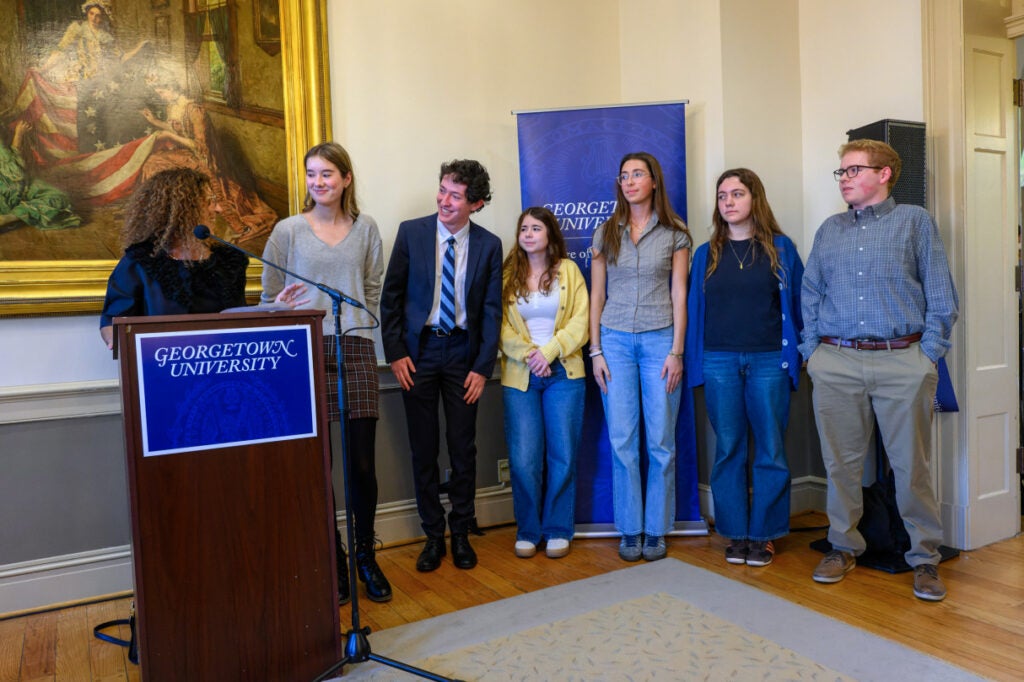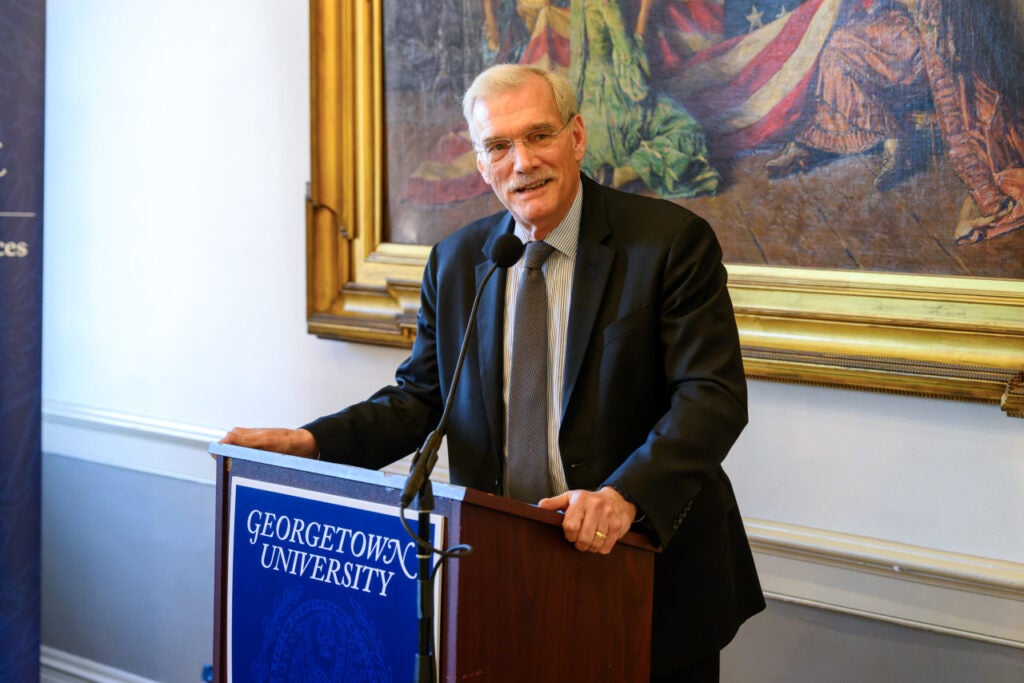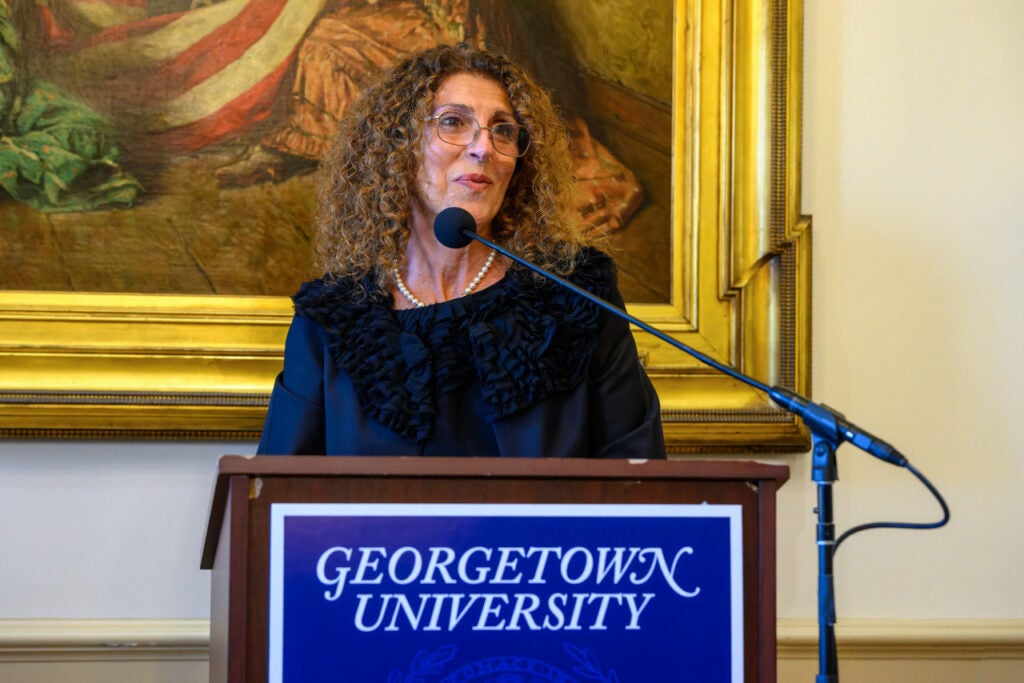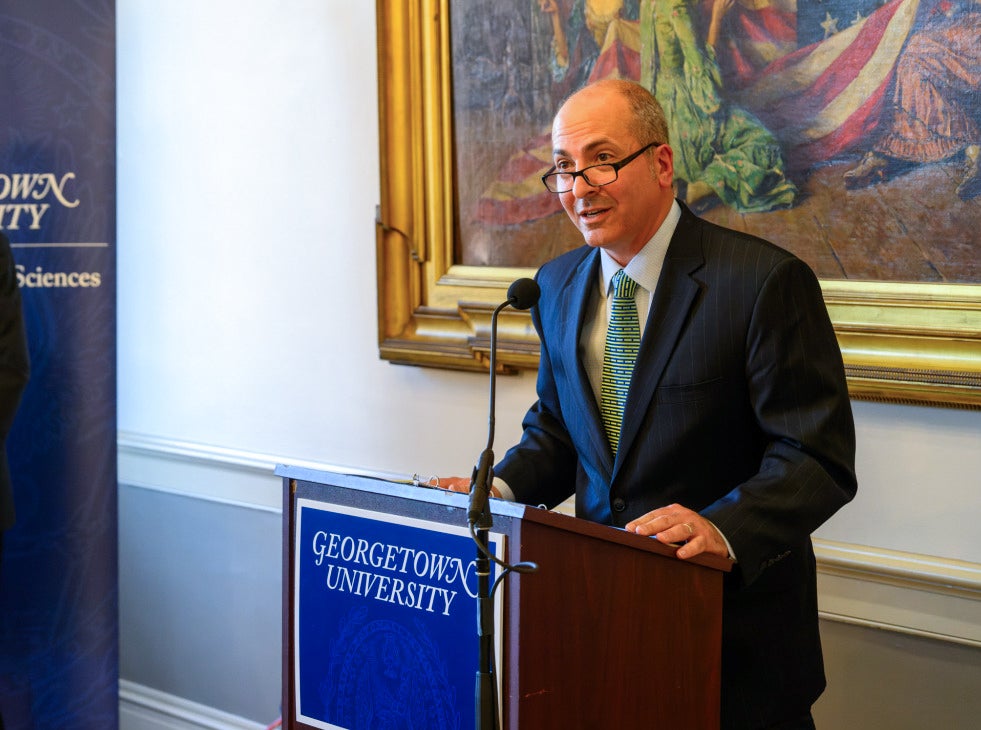Georgetown Opens New Hub for the Humanities on Hilltop Campus
The humanities have a new home on the Hilltop.
On Oct. 25, Georgetown celebrated the opening of a dedicated space for the Georgetown Humanities Initiative, a university-wide project that aims to promote and strengthen studies in the humanities.
Located between McNeir Auditorium and the Davis Performing Arts Center, the Georgetown Humanities Initiative is at the physical intersection of numerous departments and programs that comprise the humanities at Georgetown.
The space in the university’s Old North building will serve as a home for events, group discussions and other in-person work to advance the humanities.

“With the creation of the Georgetown Humanities Initiative we have been able to demonstrate that we are much more than a cluster of juxtaposed disciplines,” said Nicoletta Pireddu, inaugural director of the Georgetown Humanities Initiative. “Now, thanks to these beautiful spaces, Georgetown Humanities can finally be not only an intellectual endeavor but also a physical reality, a distinctive forum for hosting events, exchanging ideas and promoting a sense of community.”
The Georgetown Humanities Initiative, which is housed within the College of Arts & Sciences, supports faculty research and interdisciplinary collaboration in the humanities, funds fellowships for undergraduates, and develops humanities-focused programming and events for community members.
Its new space was formerly occupied by McCourt School of Public Policy offices. After the school moved to its new downtown headquarters on the Capitol Campus, the space was converted into a new central home for the humanities.
Community members gathered for a formal ribbon-cutting ceremony, with remarks from Provost Robert M. Groves, Interim Dean of the College of Arts & Sciences Andrew Sobanet and Pireddu. The ceremony concluded with a musical performance from the Georgetown University Chamber Singers.
“Georgetown’s mission is animated by critical thinking, free inquiry, creative processes and respect for words – values that are the heart of the humanities,” Groves said at the ribbon cutting. “That we dedicated the Humanities Initiative in historic Old North is a testament to the centrality of the humanities at Georgetown.”

Lifting Up the Humanities
The humanities, which include art and art history, the classics, English, history, film and media studies, foreign literatures and languages, linguistics, the performing arts, philosophy, and theology and religious studies, have been a cornerstone of a Georgetown education since the founding of the university.
In 2020, Georgetown leaders founded the Georgetown Humanities Initiative to foster collaborative projects across departments and schools that highlight the human element of research and service.

In the years following, the initiative has developed local and global partnerships, like with the School of Medicine on the Medical Humanities Initiative, with the Earth Commons on Voices on the Environment and with the University of Oxford to study the humanities and public life.
It has also funded projects dedicated to scholarship on the humanities across the university, like Melanie White, assistant professor of Afro-Caribbean studies, who received a grant this academic year to finalize her first book, Sovereign Mosquitia: Intimate Colonial Violence and Black Feminist Refusal. The book traces Black and Afro-Indigenous women’s anti-colonial performance, visual culture and political organizing on the Miskitu Coast from the 17th century to the present.
“The Georgetown Humanities Initiative is inspired by our Jesuit ideals and the university’s mission to promote a liberal arts education,” said Sobanet. “It is an extension of the commitments we make as a community to foster interdisciplinary research, teaching and public-facing projects that demonstrate the enduring value of the humanities for a better understanding of the human condition and our place in the world.”

“Research in the humanities implies creation of new knowledge and critical and artistic reinterpretation of it,” said Pireddu. “These lines of inquiry greatly benefit from diverse thinking and multiple perspectives. The new space will offer opportunities for conversations and collaborations across disciplines beyond the silos of individual activity.”
“This new home for our Initiative allows us to aspire to higher goals — from having scholars and practitioners in residence, to showcasing faculty and student work, and facilitating teamwork across academic ranks,” she said. “We are also one step closer to our ultimate objective, a full-fledged center that can make Georgetown the humanities intellectual hub of the greater Washington area and one of the most prominent in the nation.”
In the coming weeks, the initiative will be hosting a number of events in its new space, including an event with Assistant Professor Will Fleisher on why people should care about understanding AI and a talk from Guggenheim Fellow Robert Barsky on his book, The BeltLine Chronicles.
This article was originally published by the Georgetown University. Please follow the link to read the full story.
